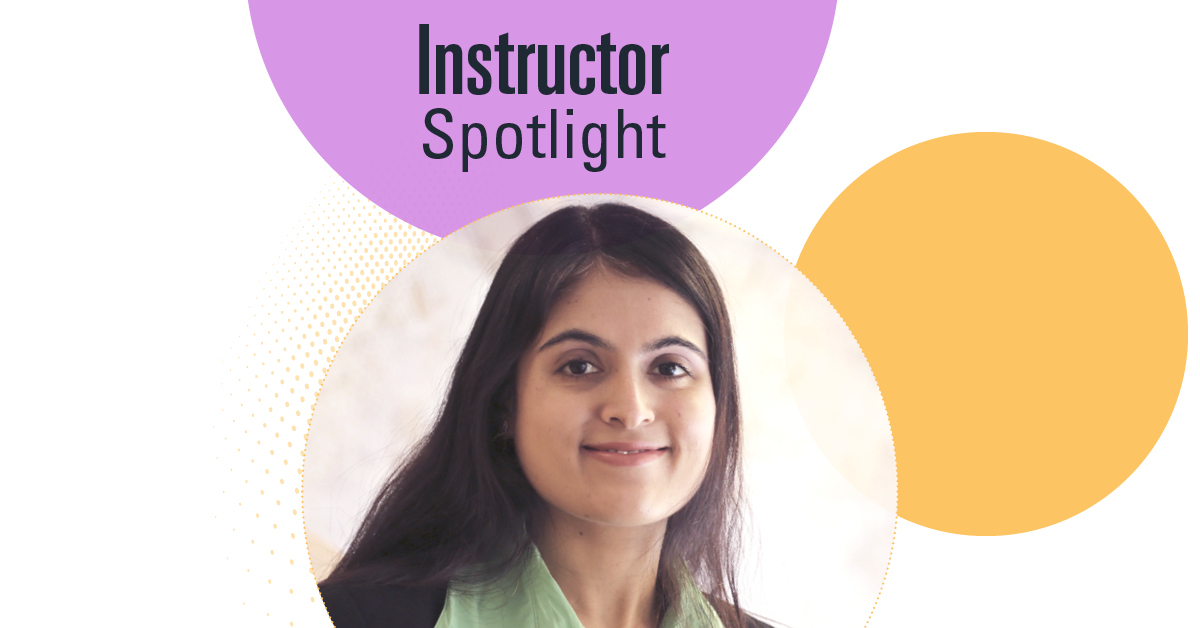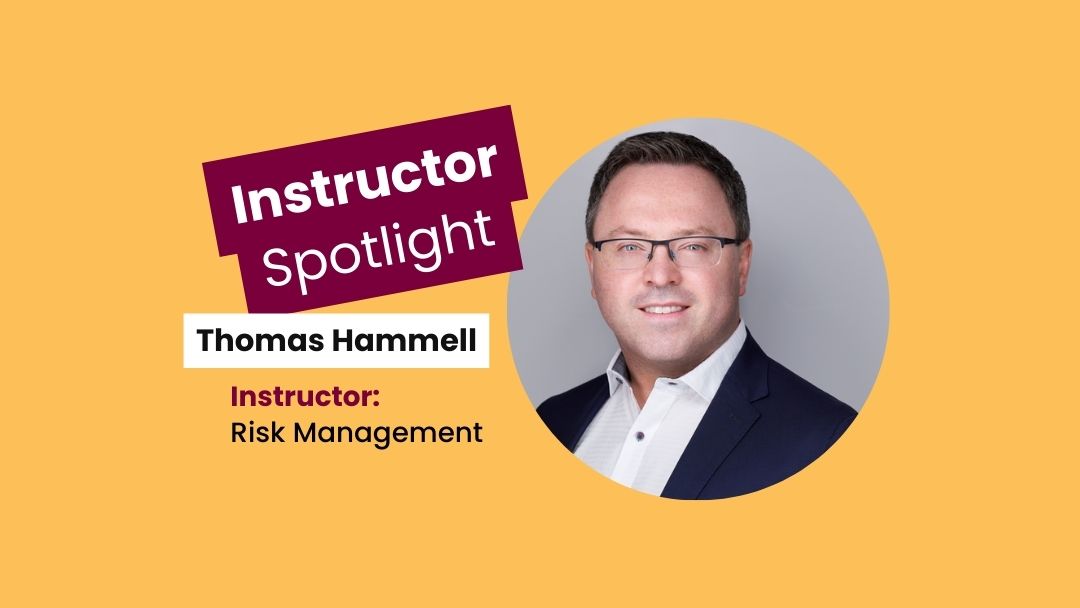Meet Dr. Vidhi Thakkar: Mentoring students in the ever-growing field of health analytics

A career in health analytics offers so many opportunities as healthcare organizations accumulate increasing amounts of patient data. The ability to collect, comprehend and act upon data generated is essential in the healthcare landscape. Healthcare organizations need employees to analyze patient data to identify trends that can improve patient outcomes and lower healthcare costs. So what does a professional in Health Analytics do? Health Analytics professionals help healthcare organizations understand patient needs, forecast results, reduce healthcare costs, and enhance patient satisfaction.
As more and more individuals are becoming interested in entering the field of Health Analytics, we sat down with Dr. Vidhi Thakkar, a stellar researcher and an instructor in both the Health Analytics and Health Informatics Diploma programs to speak about her experience, the courses she teaches and how she mentors her students.
Here’s what Dr. Vidhi Thakkar, instructor in the Health Analytics Diploma Program at McMaster Continuing Education, had to share:
Tell us a little about yourself.
I have a PhD in Health Services and Policy Research from the University of Toronto and an MSc from McGill University. I have worked with the Ontario Ministry of Health and the Canadian Institutes of Health Research and have researched and authored a variety of publications regarding the use of data analytics and artificial intelligence for the healthcare industry.
What courses are you teaching at McMaster Continuing Education?
I teach Communicating with Data, Statistics Analysis for Health Data and Health Informatics Data Analysis in the Health Analytics and Health Informatics Diploma Programs.
What made you want to become an instructor with McMaster Continuing Education?
Teaching at McMaster Continuing Education is both an honour and a privilege. I truly enjoy mentoring students and am committed to their training and professional success. I look forward to teaching and inspiring the next generation of health system leaders here at McMaster.
What is your teaching philosophy?
My teaching philosophy is focused on providing excellence for our students at McMaster Continuing Education. By that, I mean connecting course concepts and bridging them to career paths that they have in the field of data analytics and data science. As well as, getting students to visualize what their personal roadmap may look like, not only in acquiring the knowledge and skills in our program, but applying it for excellence in the healthcare system.
How would you describe your style of teaching?
Very interactive! I use a lot of visualizations of data through videos. Students learn the most up-to-date software that is currently used regularly in the healthcare industry. For example, provincial Ministry of Health hospitals use Tableau, SPSS, or SAS statistical software. Students gain hands-on experience with the same software they’ll encounter in the workplace.
I teach through workshops and allow each student to be in the driver’s seat when it comes to learning. It’s important to me to let them be the ones who are sharing their screens on Zoom, while I guide them through the steps. This helps them think critically about problems from the perspective of multiple audiences, and prepares them for communicating with patients, practitioners, and policymakers. I really want to help train and develop our students into the next generation of innovators and leaders in the healthcare community.
Who do you think can benefit most from taking the Health Analytics program?
The Health Analytics program is ideal for people who wish to pursue a career in healthcare data analysis. Students will learn how to effectively communicate with data and to appreciate the process of working with data and statistics. They’ll also be working with the same software currently used in the industry.
Do students get a taste of what it will be like working in the industry through your classes?
Yes, for example, students will prepare a presentation which will then be evaluated by a panel of experts from the healthcare industry, in the field of health data and data analytics. Each student, or group of students, will give their presentation and get real feedback from industry experts. It’s a friendly competition but it provides insight for the students as to what it will be like presenting their ideas in a professional environment. Also, sometimes there is an element of gamification, too.
Also each term, I invite guest speakers from our provincial Ministry of Health or Health Canada, as well as other organizations and healthcare agencies, allowing students the opportunity to network and build business connections or professional networks in the healthcare system. All this is to support our students in finding employment upon graduation from our program.
What are the new trends that you’re most excited about in health analytics?
I’m really interested in machine learning and artificial intelligence as they relate to health analytics and data science. For example, in a recent COVID-19 study, I worked on a national level project with colleagues at both the University of Toronto, as well as the University of Victoria. We were able to use natural language processing mechanisms to look at COVID-19 datasets. This gave us the ability to analyze the data through the lens of equity, diversity and inclusion to see if certain races or cultures are more likely to be impacted by COVID-19. It was a unique glimpse into the capabilities these trending technologies will provide.
What are some of your recent publications and research projects?
I have research interests and experience in Big Data and Data Analytics focusing on patient-oriented research and program evaluation. I was a coauthor and a collaborator on Computational Intelligence Aided Systems for Healthcare Domain, as well as on A Summary of COVID-19 Datasets. The first publication is about artificial intelligence, smart computing, and their applications in augmenting medical and health care systems. For the second, we applied new data science and natural language processing methods to solve questions about who is impacted by COVID-19. We wanted to know what we can learn from the administrative data to help inform treatments that doctors provide to patients and then share these findings with physicians.
I also recently won the highly competitive Canadian Institutes of Health Research (CIHR) Health Systems Impact Post-Doctoral Fellowship grant for my research project focused on older adults and evaluation of the COMPASS Program. Working with the University of Victoria and Victoria Hospice, this research project will help improve the health and wellness of older adults.
As a health professional, you no doubt agree about the importance of a well-rounded lifestyle. What’s your favourite thing to do when you’re not working?
I’m an avid cyclist. Going for a 5 to 7-kilometer bicycle ride on the trails or along the river, especially when spring or summer comes, is so positive and refreshing. And taking my family along with me. I think it’s something we all truly enjoy, spending time in nature and spending time with our families.
Do you have any final advice for students?
Aim high and pursue your dreams to have a positive impact in our community and health system by applying your knowledge, skills, and expertise.
Learn more about the McMaster University Continuing Education Health Analytics program and courses.
Health, Instructor SpotlightRelated News
News Listing

Meet Thomas Hammell: A Leader in Risk Management Education
Business, Instructor Spotlight, What's New
4 days ago

Mastering the Art of Self-Regulation: 5 Tips to Soothe Your Nervous System
Health, Tips Corner, What's New
December 12, 2024

